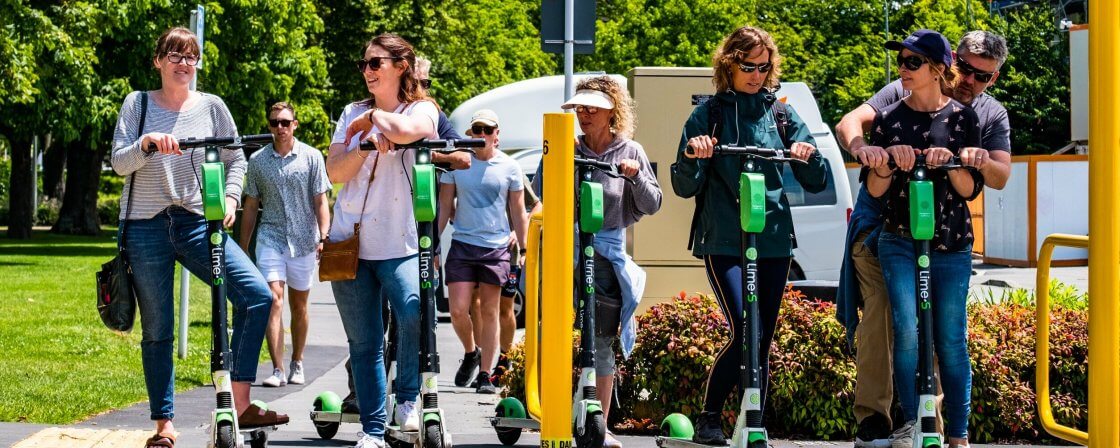The above example is, of course, a mere exaggeration. The sharing economy is not about the forced sharing of one’s possessions, but about the voluntary sharing, exchange or renting of durable goods or real estate. Shared ownership cannot be seen as a fad that will quickly pass. On the contrary, new and new forms of it are emerging, as well as other product sectors into which some of the forms of the sharing economy will spill over. However, it also has its risks.
There are many different variations – from the classic sharing of individuals’ assets (providing an apartment for short-term accommodation in the form of Airbnb), to various swapping models (where technically it is not sharing, but exchanging, for example, plants, clothes, etc.), to variants where a certain product (a car, a bicycle or a scooter) is owned by a legal entity and allowed to be used by individuals in the form of short-term rentals. Listening to music or watching films on platforms such as Spotify, Netflix, Apple TV or HBO Max works on a similar principle. And then there are the paradoxes in the form of multinational companies renting out something they do not own: whether it is the aforementioned Airbnb, the largest accommodation provider, which does not own any property, or Uber, the most widely used taxi service, which does not own any vehicles.
Are you solving a similar problem?
Looking for an answer to a question about shared ownership?
Send us your enquiry online, we will evaluate it and you will receive a prepared opinion from one of our attorneys who specializes in this area within 48 hours.
I want to consult
- When you order, you know what you will get and how much it will cost.
- We handle everything online or in person at one of our 6 offices.
- We handle 8 out of 10 requests within 2 working days.
- We have specialists for every field of law.
For many people, the models outlined are an immediate way to get something they would have to save for years, or something they would never want to own. But business models often outpace legislation, and legislators or politicians sometimes just grit their teeth, wondering how to plug the hole in the law. Airbnb is again a typical case.
Housing sharing
Few would have believed in 2008 that a startup by two not-so-wealthy designers who rented out mattresses in their home to raise money for rent would one day become a worldwide trend: Airbnb. On the one hand, a great opportunity for (not only) young people to stay anywhere they want for affordable money, on the other hand a nightmare for hoteliers, residents of the houses where Airbnb is operated, but also local politicians and finance officials.
According to critics, Airbnb raises traditional rents, spoils business for traditional accommodation services and is also one of the causes of gentrification, i.e. the depopulation of city centres from old-timers in favour of tourists. For example, one in five apartments in Prague’s historic centre is used for short-term rentals, according to IPR Prague statistics. Therefore, not only the residents of the buildings concerned, but also politicians have run out of patience.
Little hope dawned for the owners’ associations in 2020, when the Municipal Court in Prague dismissed a lawsuit brought by an Airbnb provider in Prague’s Petrská quarter against the SVJ, which had banned such activities by its statutes. The court heard the residents of the building, who described wet walls, broken doors, loss of security and privacy, and overflowing garbage bins as common occurrences in the building, and found them right.
However, the case was subsequently decided by the High Court, which took the opposite view. According to the Court, SVJs cannot effectively combat the Airbnb phenomenon through statutes. This reasoning is also valid; it is an interference with the essence of property rights.
Another interesting court decision on the subject was made in the context of taxation of income from this activity. In August 2021, the Municipal Court in Prague ruled on the nature of the income through the Airbnb platform and concluded that it was income from business activities under the Income Tax Act (and therefore not income from renting out an apartment as claimed by the applicant). According to the judgment: ‘Unlikethe provision of a person’s housing needs, the accommodation provided through Airbnb cannot fulfil the statutory purpose of renting an apartment, as it does not satisfy his need for housing, but satisfies his need for accommodation and must therefore be classified as an accommodation service. Thus, it is not very relevant whether the rental is defined as a so-called “bare rental”, but how the activity is carried out.“
Sharing of bicycles and scooters
Bicycle and scooter sharing has already spread to several dozen Czech cities and is supported by many municipalities. Enlightened councillors are interested in seeing fewer cars and less carbon dioxide emissions in the centre, drivers not fighting over parking spaces and traffic calming down. However, they are concerned about the unruly behaviour of the users of these approach vehicles. Riding on the pavement, bumping into pedestrians and leaving scooters where they have just fallen off the hands of their short-term ‘owners’ is the flip side of this phenomenon. That’s why local legislators are catching up with reality and trying to mitigate these negatives in ordinances and contracts with service providers.
Car sharing
Surprisingly, carsharing is far from arousing such emotions. However, unlike abroad, it is still in its infancy in this country. Car ownership is still a status issue in the Czech Republic. In the Nordic countries, for example, young adults usually don’t even think of buying something that only loses value every year. If regular public transport is not enough, they will at least get an electric car, use a shared car or even a bicycle.
So far, car sharing is an alternative used more in big cities, with only a few companies offering this service in Prague. For many occasional car users, it is an ideal option: they don’t have to worry about anything, they don’t have to deal with a garage, compulsory liability, a vignette or even parking fees, and they only pay for what they actually drive. And hands off me and the city councillors: this transport option is also environmentally friendly and a relief for the city.
From a legal point of view, it is more or less a classic variant of the rental contract, where, in addition, the creation of a client account, the presentation of identity and driving licence and compliance with the contract, including the general terms and conditions (conditions for returning the vehicle, respect for the defined area, etc.) are required.
Tools, clothing, fashion accessories
Distinguishing between a classic oldschool rental company and a modern trendy shared platform is sometimes a tricky business, especially from a legal point of view. But whether we are talking about one or the other, we can rent or share, for example, luxury handbags, designer clothes, or, on the other hand, a workshop with tools, a sewing machine and other useful tools. In these cases, the legal form is also usually a rental charged by the hour (sewing machine) or by the day (handbag), but the option of a membership or subscription is not excluded, whereby you can visit and use the workshop with a certain frequency upon regular payment.
Sharing music, films and photos
Perhaps the most significant shift in the last decade has taken place in the field of show business. Whereas it used to be common to buy a CD or DVD (or in earlier times a cassette or videotape) with a favourite piece of music or film, today it is more of a rarity for collectors, although perhaps the business of selling LPs is growing. Musicians had to radically turn their business model around and focus more on the profit from ticket sales or merch. Of course, the streaming platforms have to pay them for royalties, but according to the musicians, the prices are set quite low. Last year, according to Soundguys, companies paid $0.00331 per play as follows: Spotify $0.00331, Apple under its Apple Music $0.00495, Google Play $0.00543 and Deezer $0.00567.
In the area of downloading, music sharing and copyright in general, we find various legal fossils, as legislation has not adapted to the rapid developments in this sphere. So far, the whole system rests on the powerful and monopolistic position of collective rights managers such as OSA, Dilia and Intergram. The whole system is rather cumbersome and inflexible, and anyone who wanted to comply with all the legal requirements of music productions (such as reporting the repertoire of a concert 10 days before the event) would probably not organise much. The law also provides for compulsory payments for playing music in venues, without distinguishing whether the venue is a village newsagent or a multinational chain in a big city. So in the end, a lot of the rules are not followed in practice, with the implication that “it may not come to that.”
However, if we go back to our central theme, which is ownership, there is a bit of a paradox in this field, where we can play almost any album or any film in a few seconds from the warmth of our home, but the moment we stop paying the monthly fee to the platform, everything disappears. We do not own any of this, but we are also essentially renting, which is a necessary tax on the transformation of the business model in this area.
An interesting reflection in this regard was made by entrepreneur and journalist Patrick Zandl on his blog Marigold.cz (unfortunately the text is no longer available). According to him, there may be no going back from non-ownership, as the opportunity to own will gradually disappear – for both technical and financial reasons. Indeed, the negative impact of a world where we pay monthly fees for most things is also a reduction in the monthly amount of money that an individual can directly and freely decide. He sees self-regulation of the industry or other regulation of non-ownership as a necessary solution, so that it is not the only and one-way option, but only one of the alternatives.




